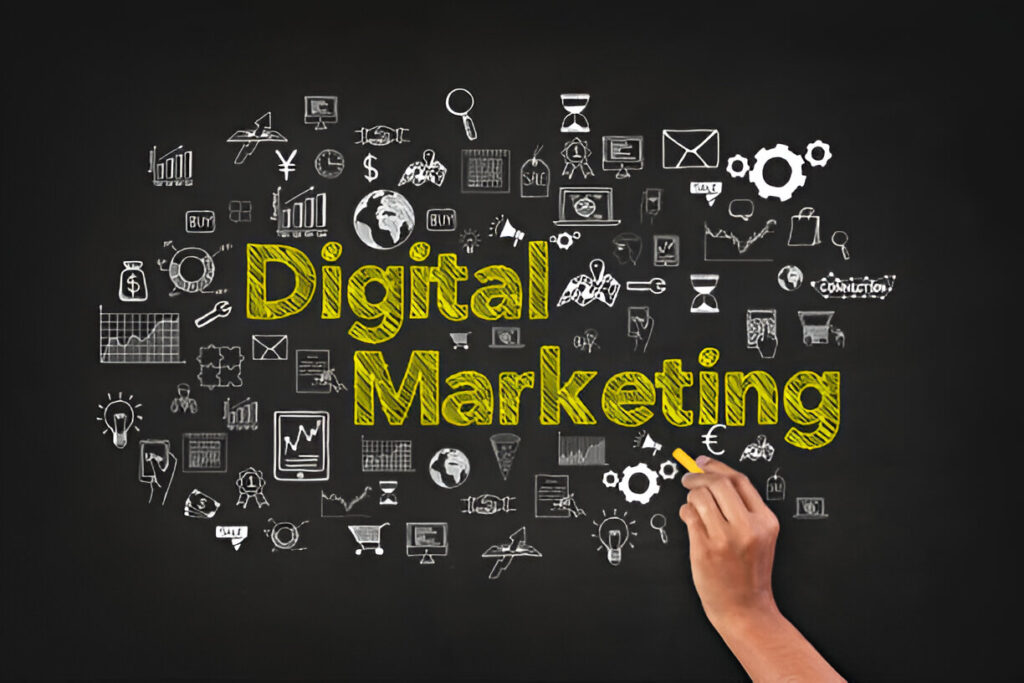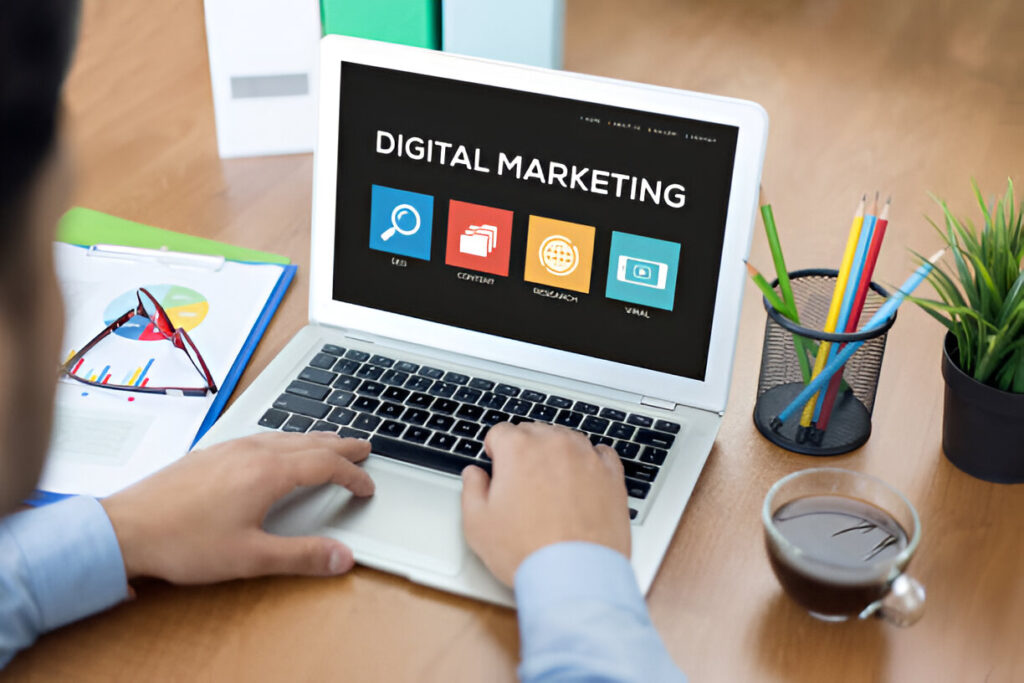A digital marketing business
The digital age has transformed the way businesses connect with customers. With billions of people spending hours online daily, companies can no longer rely only on traditional advertising. Instead, they are turning to digital marketing as the most effective way to grow.






This shift has created massive opportunities for entrepreneurs to build their own digital marketing businesses. Unlike traditional businesses that require heavy investments, a digital marketing company can be started with relatively low costs and scaled rapidly with the right skills, strategy, and execution.
This guide explains everything you need to know about starting your own digital marketing business — from building skills and choosing services to acquiring clients, scaling operations, and overcoming challenges.
Understanding the Digital Marketing Landscape

What Digital Marketing Really Means
Digital marketing is the practice of promoting products or services online using platforms like search engines, social media, websites, and email. It includes strategies such as:
- Search Engine Optimization (SEO)
- Social Media Marketing
- Pay-Per-Click Advertising (PPC)
- Content Marketing
- Email Campaigns
- Influencer Collaborations
Why It’s a Profitable Industry
- Businesses spend billions each year on digital advertising.
- Startups and small companies seek affordable, results-driven marketing.
- Growth rates in this industry outpace most traditional sectors.
- Services can be delivered remotely, making it accessible worldwide.
Gaining Knowledge and Building Skills

Before offering services to clients, it is essential to gain expertise in core digital marketing areas.
Essential Skills
- SEO and keyword research for ranking websites.
- Social media management across platforms like Instagram, TikTok, LinkedIn, and Facebook.
- Paid advertising strategies for Google Ads and Meta Ads.
- Data analysis through Google Analytics and similar tools.
- Copywriting and content creation for blogs, ads, and social media posts.
Learning Resources
- Online courses from HubSpot, Coursera, and Udemy.
- Free certifications like Google Skillshop and Meta Blueprint.
- Practicing campaigns on your own blog or social pages.
Clients pay for measurable results. Building strong skills is the foundation of credibility.
Choosing the Right Niche
Digital marketing is a wide field. Instead of trying to serve everyone, specialization helps you stand out.
Examples of Profitable Niches
- Real estate marketing.
- E-commerce growth strategies.
- Food and restaurant marketing.
- Health, wellness, and fitness.
- Education and coaching services.
Why Niches Matter
- Position yourself as an industry expert.
- Reduce competition with generalist agencies.
- Build stronger client trust by solving specific problems.
Crafting a Business Plan

A successful agency requires a clear roadmap.
Elements of a Strong Plan
- Services you will offer.
- Target clients (startups, SMEs, or corporates).
- Pricing structure and revenue model.
- Short- and long-term growth goals.
- Strategies for marketing your own agency.
Even a concise plan provides focus and helps measure progress.
Registering Your Business
Formal registration builds trust and protects your interests.
Common Structures
- Sole Proprietorship: Easy to start but no liability protection.
- LLC (Limited Liability Company): Best for liability protection.
- Corporation: Suitable for large-scale agencies planning future expansion.
Additional steps include opening a business bank account, setting up tax registrations, and ensuring legal compliance in your region.
Building a Brand Identity

Your brand is the first impression potential clients get.
Elements of Brand Identity
- A memorable business name.
- A professional logo and brand colors.
- A website that serves as your online office.
- Social media profiles that showcase expertise.
Perception equals trust. A strong, consistent brand identity positions your business as credible and professional.
Selecting Services to Offer
You don’t need to provide every service at launch. Start with your strengths and expand gradually.
Popular Digital Marketing Services
- SEO optimization.
- Social media management.
- PPC advertising campaigns.
- Email marketing automation.
- Content creation (blogs, videos, graphics).
- Website design and development.
Agency Models
- Specialist agencies that focus on one area (like SEO).
- Full-service agencies that cover multiple areas under one roof.
Creating a Strong Online Presence
Clients will always check your online presence before hiring.
Website Must-Haves
- An engaging “About Us” page.
- Service descriptions with clear outcomes.
- A blog to display knowledge and attract traffic.
- Easy-to-use contact forms.
Social Media Presence
- LinkedIn for B2B networking.
- Instagram and TikTok for creative showcases.
- Twitter for updates and quick industry insights.
Tools and Technology

Running a digital marketing business efficiently requires using the right tools.
Essential Tools
- SEO: Ahrefs, SEMrush, Google Analytics.
- Social Media: Buffer, Hootsuite, Later.
- Advertising: Google Ads Manager, Meta Ads Manager.
- Design: Canva, Photoshop, Adobe Creative Suite.
- Project Management: Trello, Asana, Slack.
Investing in tools saves time, improves results, and scales operations.
Building a Team
You may begin solo, but as your client base grows, building a team becomes necessary.
Key Roles in an Agency
- SEO specialist.
- Content writer.
- Social media manager.
- PPC strategist.
- Graphic designer.
- Client account manager.
You can start by outsourcing to freelancers and later hire full-time employees.
Pricing Your Services
Setting the right pricing model is crucial to profitability.
Common Pricing Models
- Hourly billing for small tasks.
- Retainer packages (monthly fixed fee).
- Project-based pricing for one-time jobs.
- Performance-based pricing where payment is linked to results.
Best Practices
- Study competitor pricing.
- Start affordable while building credibility.
- Increase rates as your reputation grows.
Attracting and Retaining Clients
Getting clients is often the hardest step for new agencies.
Ways to Land Initial Clients
- Freelance marketplaces like Upwork or Fiverr.
- Networking through LinkedIn and business groups.
- Cold email outreach with customized offers.
- Hosting free webinars or workshops.
- Offering discounted services to build case studies.
Long-Term Client Acquisition
- Develop testimonials and portfolios.
- Run your own marketing campaigns as proof.
- Invest in ads to target business owners.
Happy clients often lead to referrals, reducing acquisition costs.
Delivering Results That Matter
The real strength of a digital marketing business lies in performance.
How to Deliver Value
- Provide monthly reports on traffic, leads, and ROI.
- Stay transparent with strategies.
- Continuously optimize campaigns.
Consistent results build long-term relationships and a strong reputation.
Scaling the Business
Growth requires expanding services, hiring more staff, and leveraging automation.
Ways to Scale
- Offer new services like video marketing or influencer campaigns.
- Hire skilled professionals to handle larger accounts.
- Partner with other agencies to expand reach.
- Expand internationally using remote teams.
Role of Automation
Automation in reporting, email campaigns, and scheduling frees time to focus on strategy and growth.
Challenges and How to Overcome Them
Running a digital marketing business is rewarding but not without challenges.
Common Challenges
- Constant algorithm changes from Google, Facebook, and TikTok.
- High competition in the agency space.
- Clients expecting instant results.
- Cash flow issues during early stages.
Overcoming Obstacles
- Invest in continuous learning and certifications.
- Set clear contracts with timelines.
- Diversify your client base across industries.
- Keep a financial buffer for tough months.
Conclusion
A digital marketing business is one of the most promising ventures in today’s economy. It requires more skill and creativity than heavy capital, making it accessible to ambitious entrepreneurs worldwide.
The keys to success are simple but demanding:
- Build strong expertise.
- Choose a focused niche.
- Create a professional brand identity.
- Deliver measurable results.
- Scale strategically with the right team and tools.
With persistence, adaptability, and client-focused strategies, your agency can evolve from a small startup to a global name in the digital marketing world.

